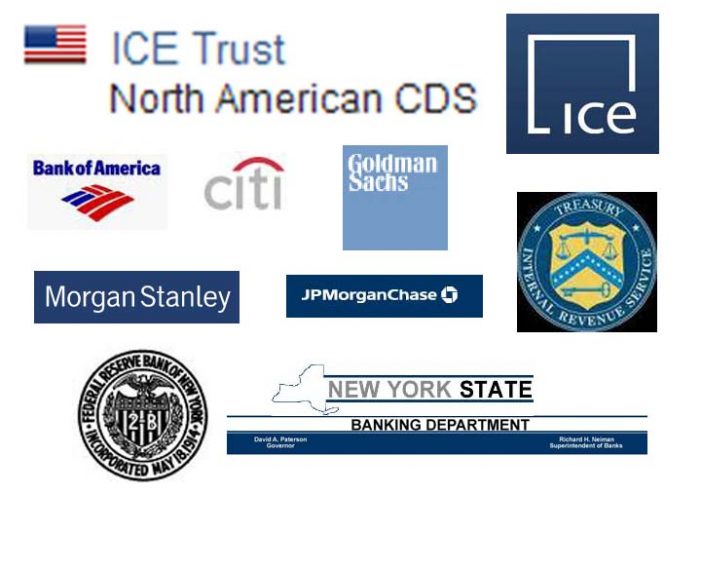Banks, Corporate Abuses, Featured, Offshore, Scoops

The American Interest, July-Aug 2010 (online May 18, 2010) –
As I write this, the U.S. Senate is debating a major financial reform bill in which the credit default swap, a kind of derivative, plays a significant part. An amendment to that bill, proposed by Senators Carl Levin (D-MI) and Jeff Merkley (D-OR), would ban banks from proprietary trading. There are a lot of high-rolling bankers who do not want that amendment to pass, because it will mess up their plans to repatriate foreign profits into the United States, untaxed, by trading in derivatives on their own accounts. The clearinghouse ICE Trust U.S. forms a central part of these plans.
What is ICE Trust U.S., and who owns it? ICE US Holding Co., which was established in 2008 as the parent of ICE Trust U.S., is located in the Cayman Islands. Yet none of the owners of ICE US Holding Co. are based in the Caymans. Among the owners of the Cayman‘s company are Citigroup, Goldman Sachs, J.P. Morgan, Merrill Lynch and Morgan Stanley, which are headquartered in New York. Bank of America, which now owns Merrill Lynch, is based in Charlotte, North Carolina.
Banks, Offshore, Regulation & enforcement, Scoops
Inter Press Service (IPS), Feb 3, 2010 –
The global bank HSBC may be running offshore accounts for central banks. According to a U.S. Senate investigation, an HSBC subsidiary in London called HSBC Equator Bank had a sister bank in the Bahamas.
According to an internal e-mail, the bank told HSBC USA it had been providing offshore accounts to central banks for 20 years, because the banks wanted to avoid Mareva injunctions, legally enforceable orders to freeze funds.
Banks, Blog, Offshore
April 10, 2007 –
The NY Times reports today that Charles Prince, CEO of Citigroup, is planning to cut the corporation‘s compliance staff.  Reporter Eric Dash says it‘s “to keep the bank from getting bogged down” because “the compliance overhang has made it difficult to be competitive” and “unnecessarily slowed the company down.”
Reporter Eric Dash says it‘s “to keep the bank from getting bogged down” because “the compliance overhang has made it difficult to be competitive” and “unnecessarily slowed the company down.”
Translation: other banks are laundering profits or running scams to help clients cheat tax authorities and investors, and they make good money at it. Why shouldn‘t we?
Dash noted that Citigroup had beefed up its compliance staff after scandals, including its dealings with Enron. He skimps on details: that Citigroup set up offshore shell companies to help Enron cook the books.
Banks, Corporate Abuses, Major Past Articles, Offshore, Regulation & enforcement, Scoops
Is Citibank Spain a tax cheat?
New Internationalist, Aug 2006

With help from a whistleblower, I followed the money trail through the offshore operations of Citigroup, the world‘s biggest bank, and discovered that Spanish bankers handling their client’s offshore accounts were getting commissions via an internal accounting system instead of on the regular books.
It is the same internal system that Citigroup used in the 1970s to compensate currency traders in Paris, London, Frankfurt and elsewhere who booked trades in the tax haven Nassau, the Bahamas. They were exposed by an insider, were investigated by the SEC and Congress, and had to pay millions in back taxes. Is this happening again?
Banks, Corporate/Wall St., Offshore, Scoops
In These Times, March 15, 2002
The world‘s biggest banks and multinational corporations have set up a shadowy system to secretly move trillions of dollars”a system that can be exploited by tax evaders, drug runners and even terrorists.
In the tax haven of Luxembourg, a little-known outfit called Clearstream handles billions of dollars a year in stock and bond transfers for banks, investment companies and multinational corporations. But a former top official of this “clearinghouse” says Clearstream operates a secret bookkeeping system that allows its clients to hide the money that moves through their accounts.
Banks, Corporate/Wall St., Offshore, Scoops
Pacific News Service, Oct 4, 2001
NEW YORK–A controversial European book that might help authorities track terrorist funding sources remains unpublished and relatively unknown in the United States.
”Entitled Revelation$,it exposes a secret banking system that might be used by terrorists. At the center is a clearinghouse in Luxembourg called Clearstream, which transfers money for international banks and major companies.
Written by a former high-ranking Clearstream official and a French journalist, its publication last February by Les Arenes in Paris triggered the firing of Clearstream’s top officials, a judicial inquiry in Luxembourg, and invitations to the authors to address members of the European Parliament and the French parliamentary commission on financial crime and money-laundering.


